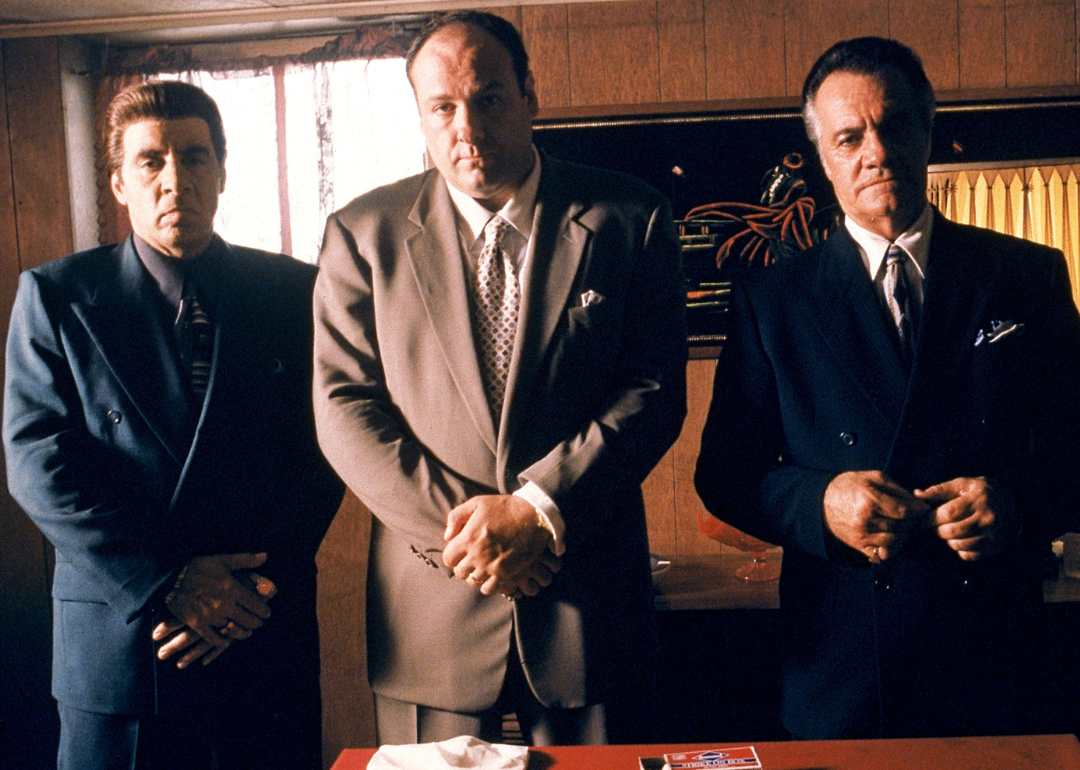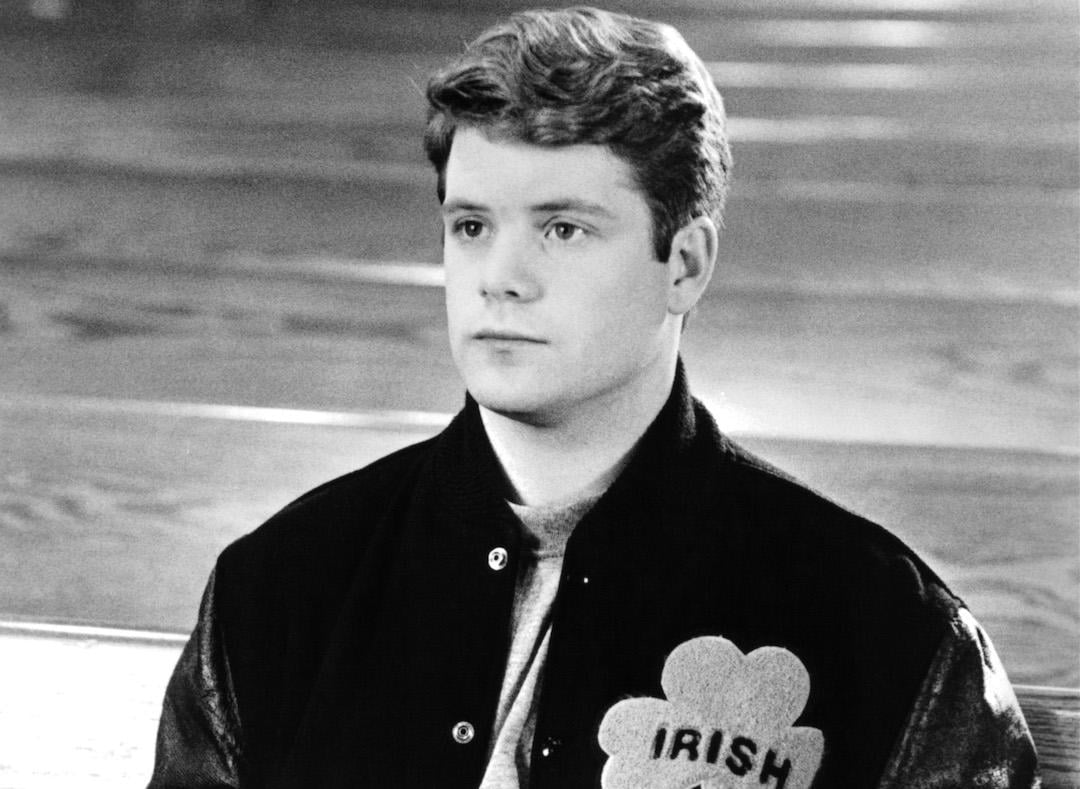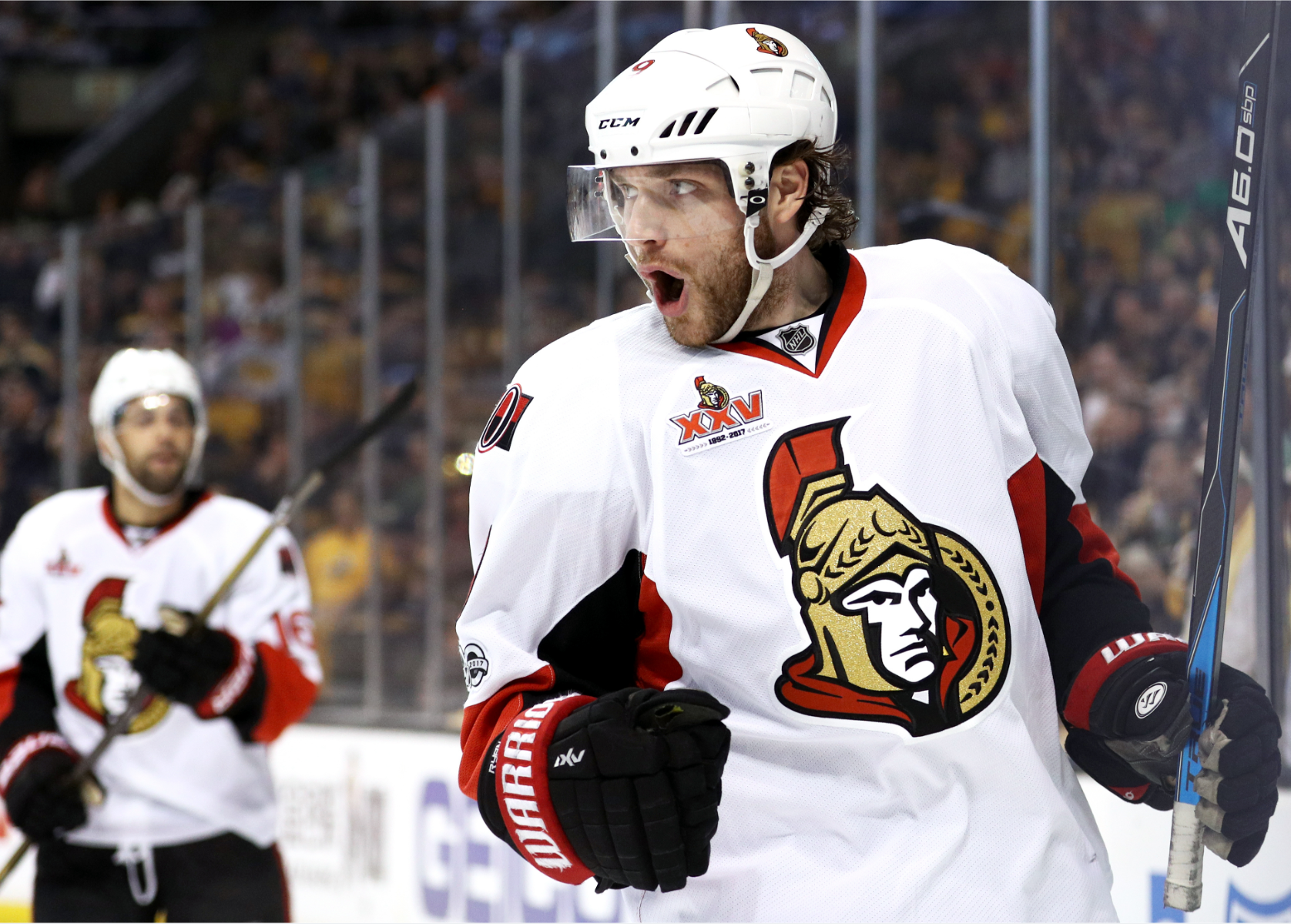
Stories behind every NHL team name
Stories behind every NHL team name
Seattle hockey fans have been buzzing about their new team's name since the NHL picked the city to have its 32nd franchise back in 2018. With the July 23 announcement of the Seattle Kraken and its logo that is reminiscent of the city's first team—the Seattle Metropolitans—fans can now get excited about a franchise that already evokes feelings of mystery and power, and will bring another exciting twist to a sport that is already filled with spectacular showmanship and unexpected upsets.
Team colors, logos, images of players, and heroic maneuvers on the ice are ubiquitous with fandom, as die-hards spend money traveling to games, purchasing tickets and merchandise, and generally serving as walking advertisements for the team they support. Knowing something about the history and trivia behind your team connects to an important part of the psychology that unites otherwise random people in a connected social experience.
The longest-running fan bases are those of the iconic “Original Six” teams in the league, and their logos, mascots, and colors are easily the most recognizable: The yellow and black of the Bruins; red and black of the Chicago Blackhawks; red and white of the Detroit Red Wings; blue and white of the Toronto Maple Leafs; and the red, white, and blue of both the Montreal Canadiens and New York Rangers.
How does a team come to be known as a bear, fish, bird, plant, or a historical figure, anyway? How does an owner assure buy-in from the fanbase, with a name that is both connected to the place and can inspire an appealing logo and mascot?
To find out more about how all 32 NHL teams got their names (and how some owners rebranded teams when they moved to different cities), Stacker searched for answers in team histories from the National Hockey Association's (NHA) founding in 1909 to its replacement as the NHL in 1917 and the comings and goings of other leagues to today. If a current team had a through-line in any of these leagues, we found out when and where they played, what they were called, and why. Sources include NHL.com, local history sites, and fan sites. We discovered how prevalent it was to have fan involvement in the naming process, through contests and voting.
Read on to learn which team was named after a Disney movie, and which one was inspired by a team at the U.S. Military Academy.
You may also like: 30 famous athletes who received lifetime bans
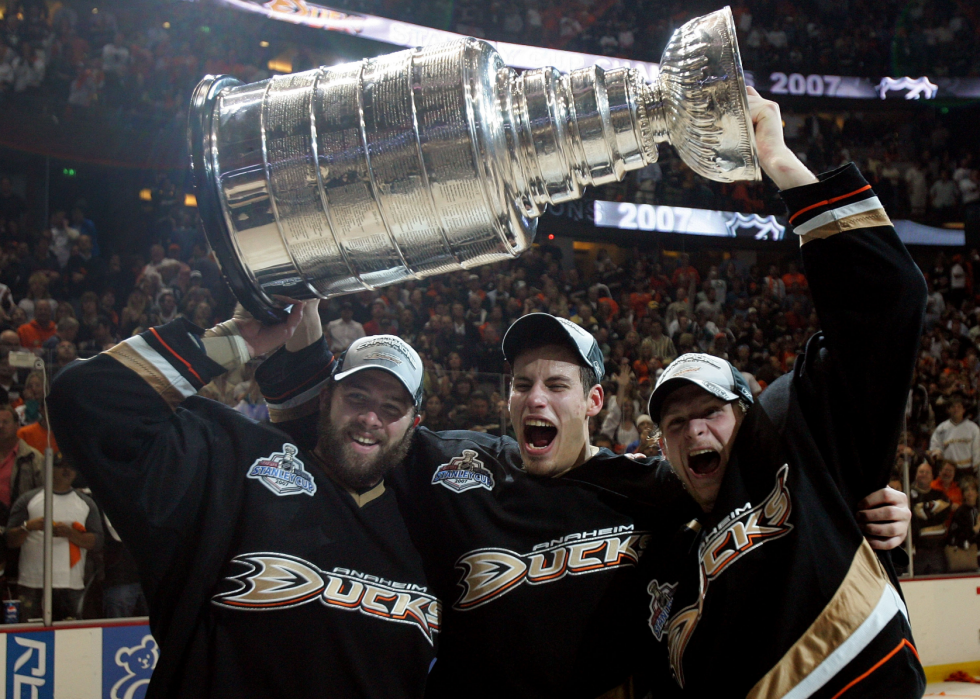
Anaheim Ducks
Founded by the Walt Disney Company in 1993, the Anaheim Mighty Ducks were named after the 1992 film “The Mighty Ducks.” When Disney sold the team in 2005, the new owners dropped the adjective from their team's name. Two years later the Ducks won the franchise’s only Stanley Cup.
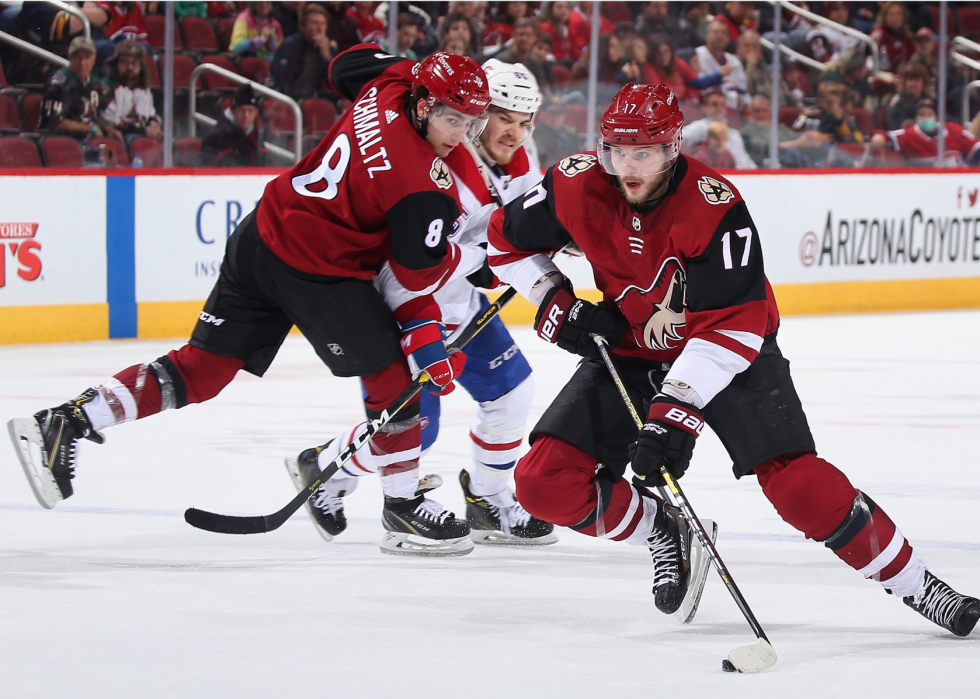
Arizona Coyotes
The Arizona Coyotes began as the former World Hockey Association’s Winnipeg Jets in 1971. When team owners moved the franchise to the Phoenix area in 1996, a more appropriate geographic name was chosen by fans in a naming contest, beating out the Scorpions. The Coyotes’ only success has been their lone division title for the 2011-12 season.
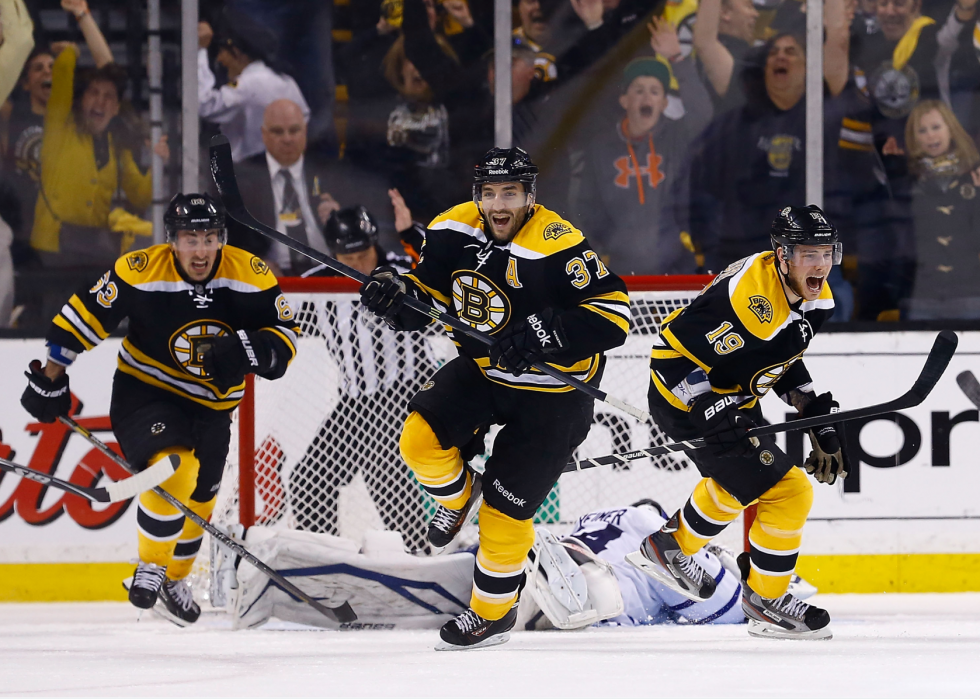
Boston Bruins
In 1924, advertising dollars had the power to shape what we see and believe—just like today. When a grocery store tycoon in Boston, Charles Adams, started a hockey team, he didn't have a name in mind. If the name and colors matched the yellow-and-brown color scheme of his store, he was happy. The quick and cunning brown bear, or “bruin” in Old English folk tales, was a good fit for the color—and for the temperament of the “Original Six” team. The Bruins won their sixth Cup in 2011.
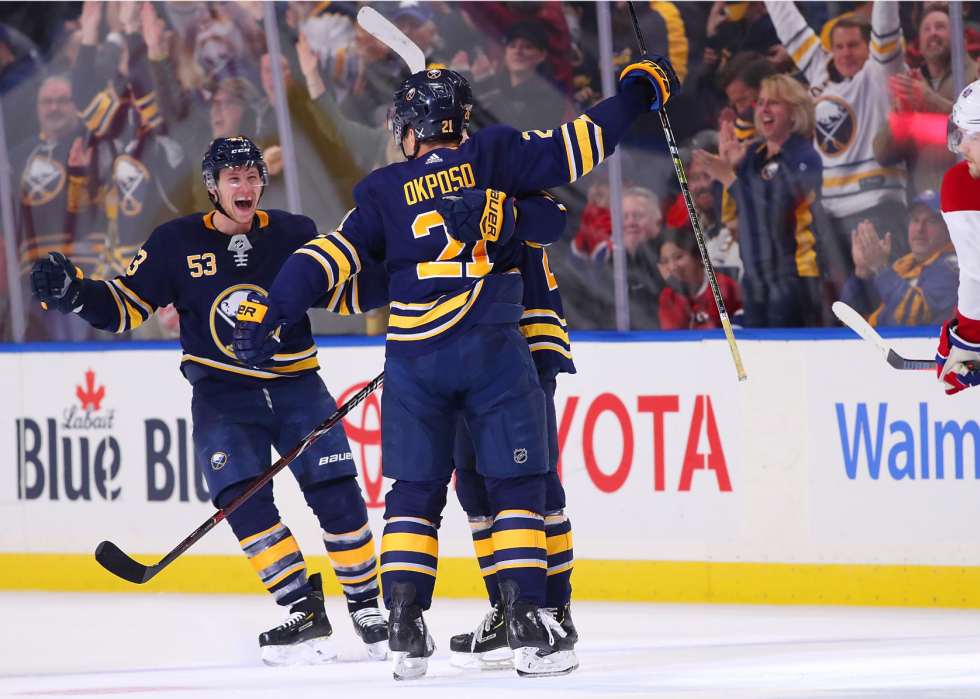
Buffalo Sabres
The city of Buffalo has plenty of names playing off Buffalo Bill Cody, or buffalo the animal. So when the city's hockey team was founded in 1970, owners wanted to be innovative. What more effective way than to invite fans to submit names? Sabres was the clear winner. The logo of a buffalo appearing to leap over a pair of crossed sabres evokes daring and agility. The Sabres have reached three Stanley Cup finals but have never won.
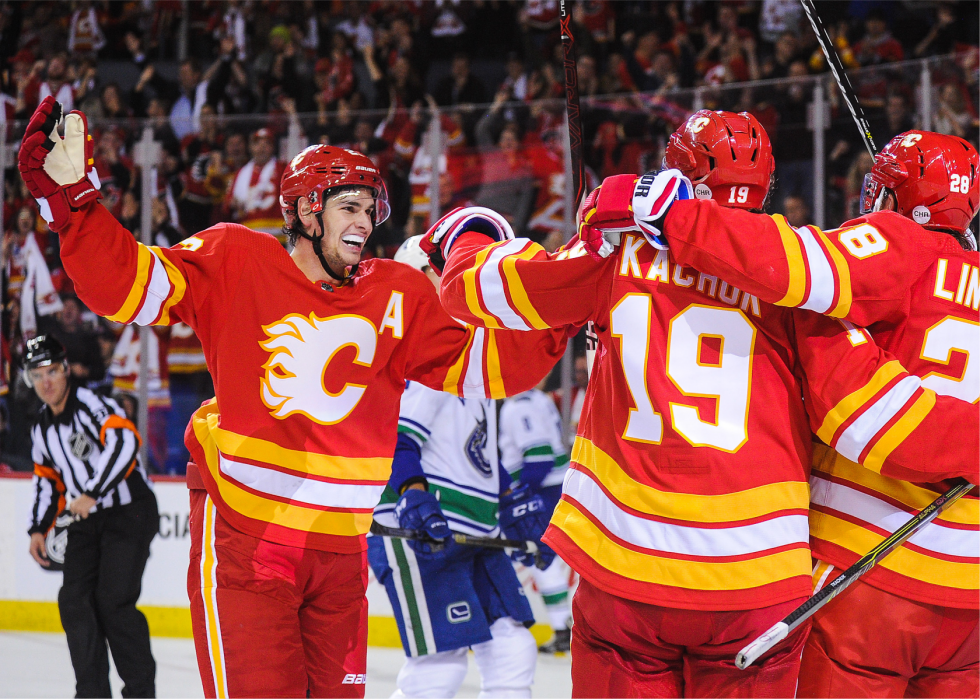
Calgary Flames
The image of a place on fire makes perfect sense when thinking about the city of Atlanta, Ga., which burned during a Civil War battle in 1864. Thus Atlanta's hockey team was named the Flames in 1972; when the team moved to Calgary in 1980, the name went with it. They won their only Stanley Cup in 1989.
You may also like: Major sports headlines from the year you were born
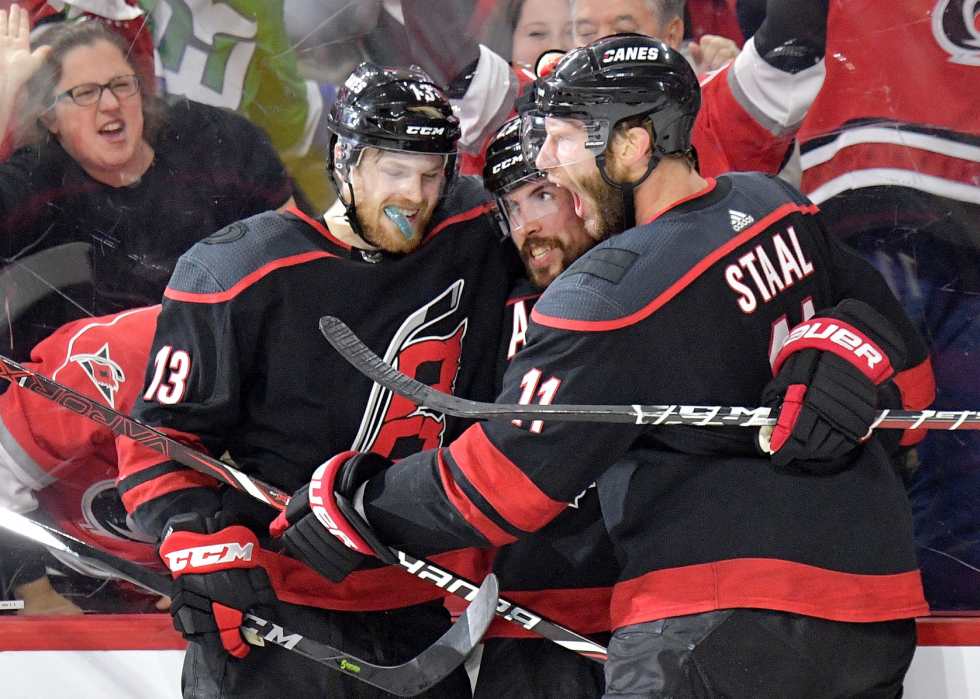
Carolina Hurricanes
This aptly named team was originally based in New England in 1972 and known as the Whalers (and later the Hartford Whalers). The golden era of New England whaling is long gone, but the era of the hurricane shows no sign of going extinct in Raleigh, N.C. The Hurricanes have been to two Stanley Cup finals, winning in 2006.
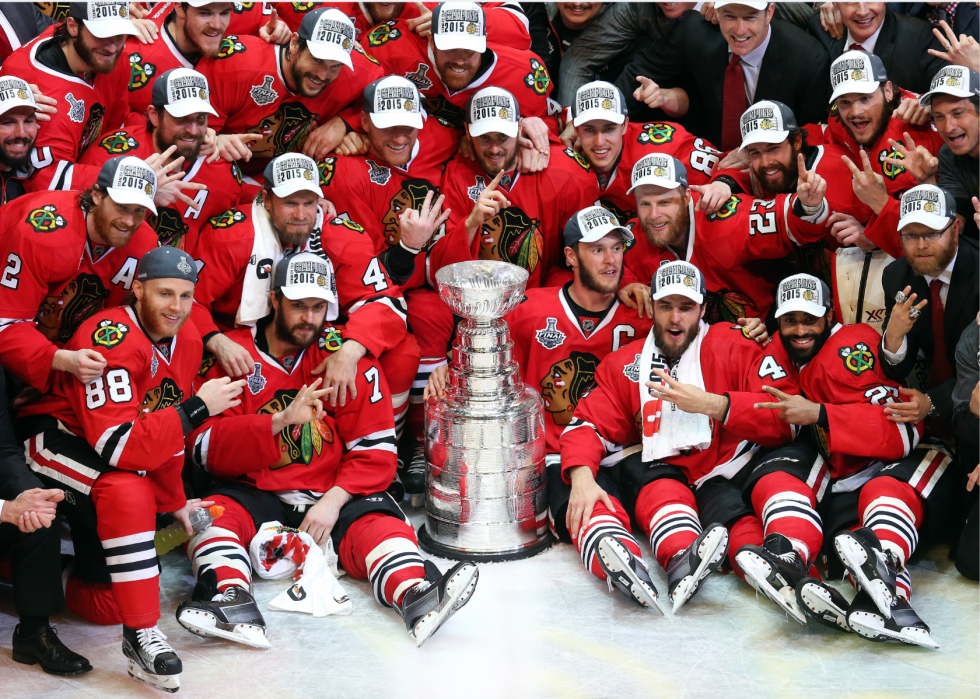
Chicago Blackhawks
A Native American leader of the Sac and Fox tribe, Black Hawk was a major figure in the War of 1812 and other important moments in U.S. history. His name carried forward, lending itself as a nickname of the 86th Infantry Division during World War I. Frederic McLaughlin, a commander in that division, would go on to own an expansion hockey team in 1926—one of the “Original Six”—naming it after Black Hawk, referencing both the man and the division. They’ve won six Stanley Cups, most recently in 2015.
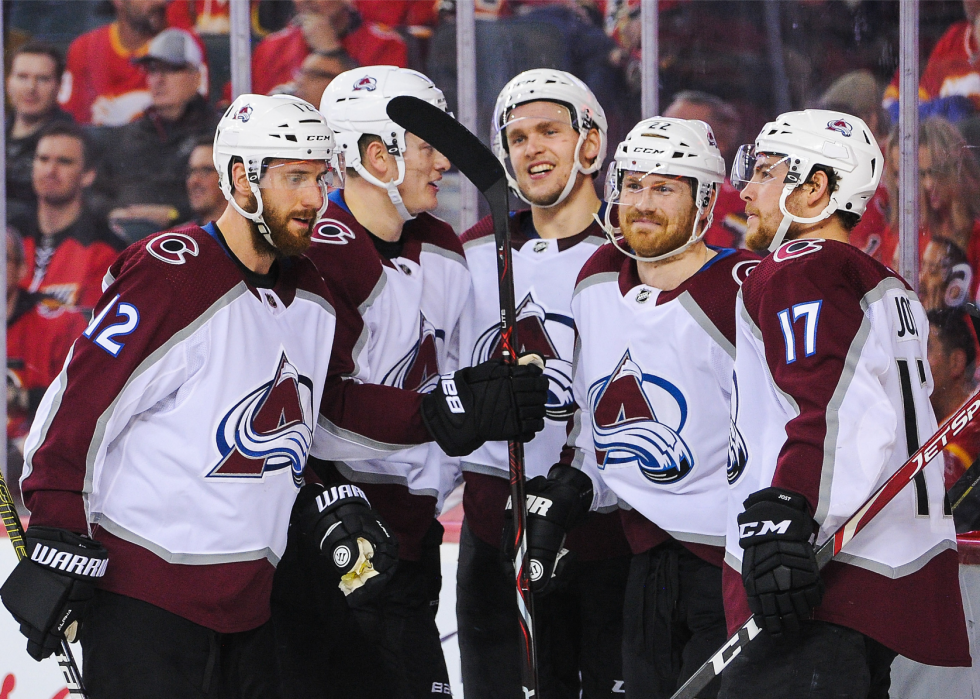
Colorado Avalanche
The Avalanche were originally the Quebec Nordiques when the team was located in Canada from 1972 to 1995. Team owners tried out several ideas that conjured the outdoors flavor of their new location in Denver: “Extreme,” “Blizzard,” and “Black Bears.” Fans in the Rocky Mountain region ultimately supported the choice of Avalanche—especially when they won their first of two Cups in their debut Colorado season.
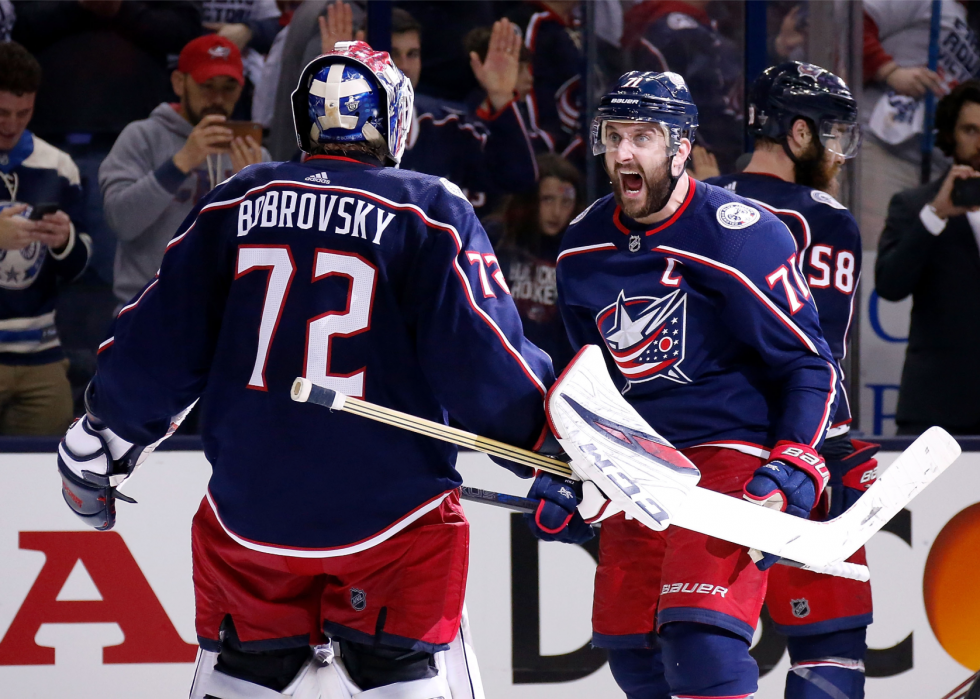
Columbus Blue Jackets
In 1997, the NHL granted Columbus, Ohio, an expansion hockey franchise, the search for a name was on. The owners teamed up with Columbus-based Wendy's restaurants to invite fan input. The resulting 14,000 entries became 10; then 10 became two, with “Justice” as the other contender. Blue Jackets got the nod because the name evoked the area's efforts in the Union Army during the Civil War. They’ve never reached a Cup final.
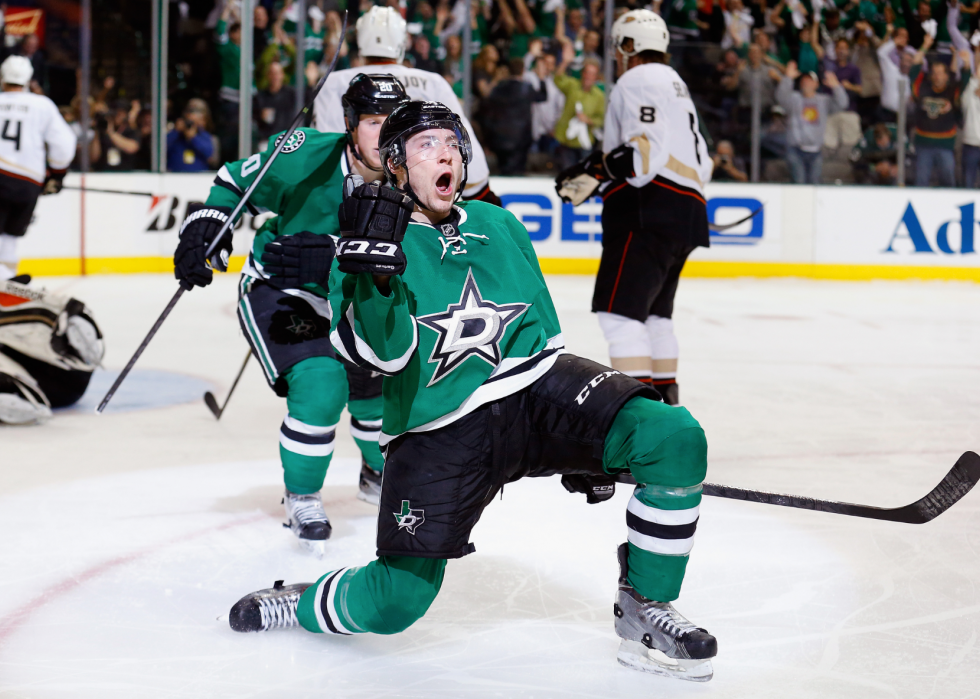
Dallas Stars
From 1967, the Minnesota North Stars shone over Minneapolis—until they didn't. A combination of poor attendance, venue problems, and owner Norman Green's personal difficulties prompted the team to head south to Texas in 1993. Roger Staubach of the Dallas Cowboys helped convince Green that the city would be a good market, and the newly (shortened) named Stars arrived in time for the 1993–94 season, paying homage to the North Stars and the Lone Star State. In 1999, Dallas won its only Stanley Cup.
You may also like: Highest-paid players in the NBA
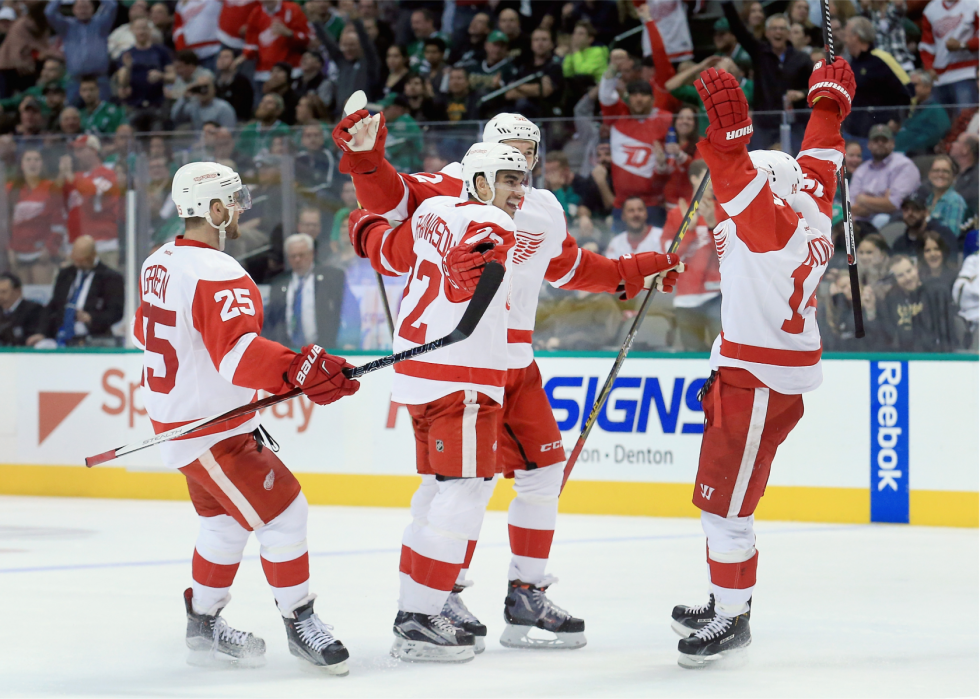
Detroit Red Wings
One of the “Original Six” members of the NHL, the Red Wings began as the Cougars in 1926, then became the Falcons in 1930. But logos with predatory mammals and birds of prey were eventually replaced by the milder but still feisty red wing. James E. Norris bought the team in 1932 and changed the name to the Detroit Red Wings for two reasons: to honor the winged-wheel emblem of the Montreal amateur athletic club for whom he’d previously played hockey, and to evoke the “Motor City.” The franchise has lifted the Cup 11 times.
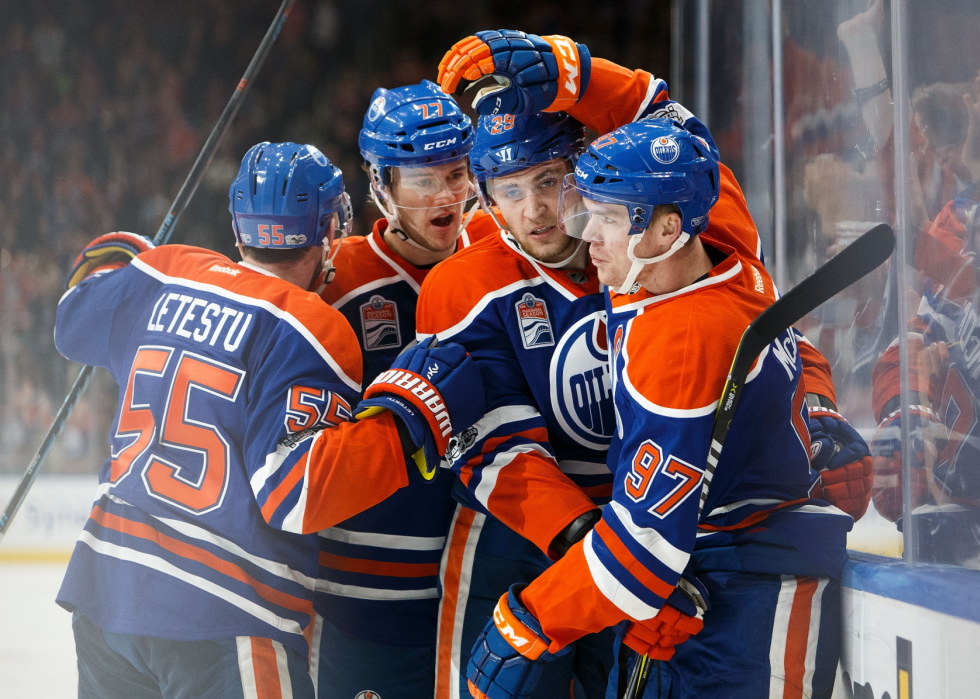
Edmonton Oilers
The World Hockey Association (WHA) gave the NHL a run for its money in the 1970s, but eventually the older of the two organizations prevailed. As a result, several WHA teams were absorbed into the NHL, including the Alberta Oilers in 1973. The team name was kept in part because it reflects the importance of oil as a resource in the province of Alberta. Edmonton won five Stanley Cups between 1984 and 1990.
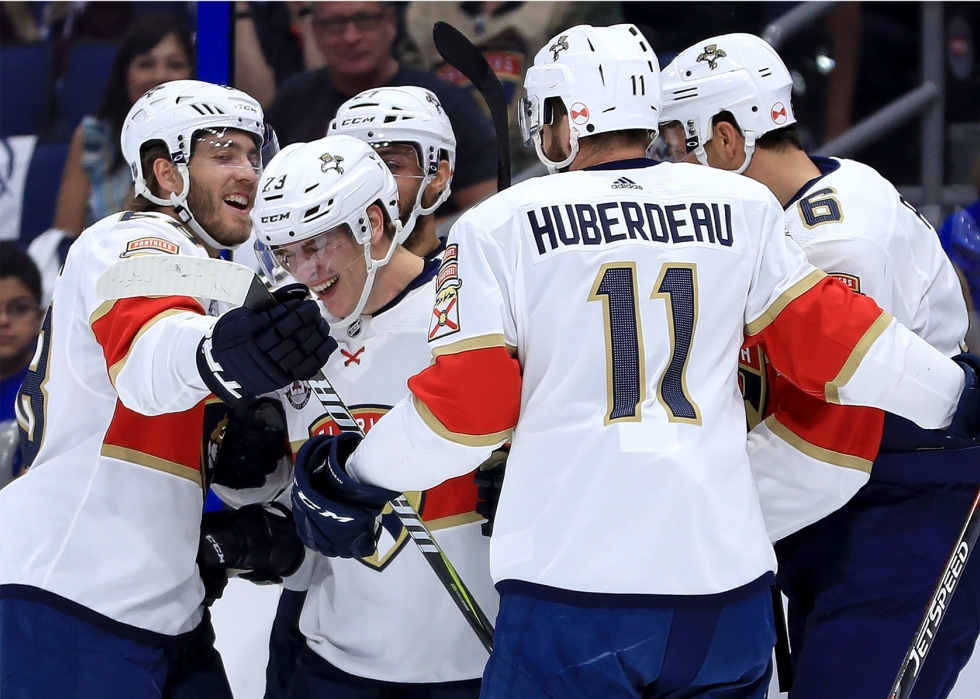
Florida Panthers
Although once abundant, the population of the Florida panther—which is actually a cougar—is now an endangered species. However, they have heightened name recognition in non-tropical areas because of the hockey team, which was part of the owner's goal all along. The Panthers have played in the Miami metro area since 1993 and have reached one Stanley Cup final.
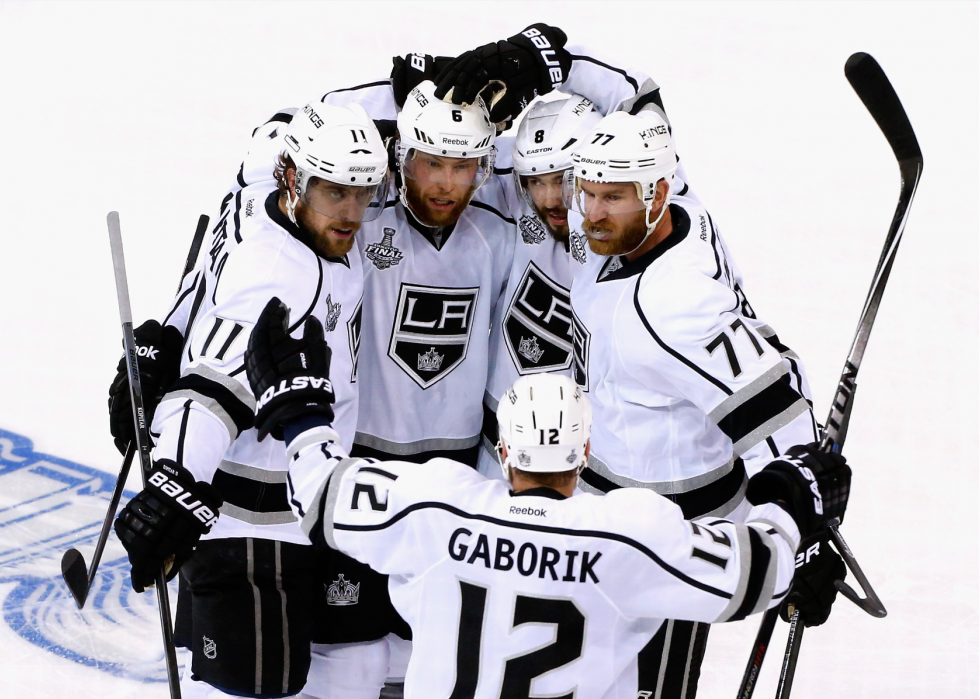
Los Angeles Kings
Metropolitan Los Angeles currently has 11 major league professional teams between football, basketball, soccer, and hockey. Even when the city was awarded an expansion franchise back in 1966, there were plenty of other teams. So team owner Jack Kent Cooke turned to fans to find a name that would stand out. The suggestion of royalty fit the bill. The Kings won their two Cups in 2012 and 2014.
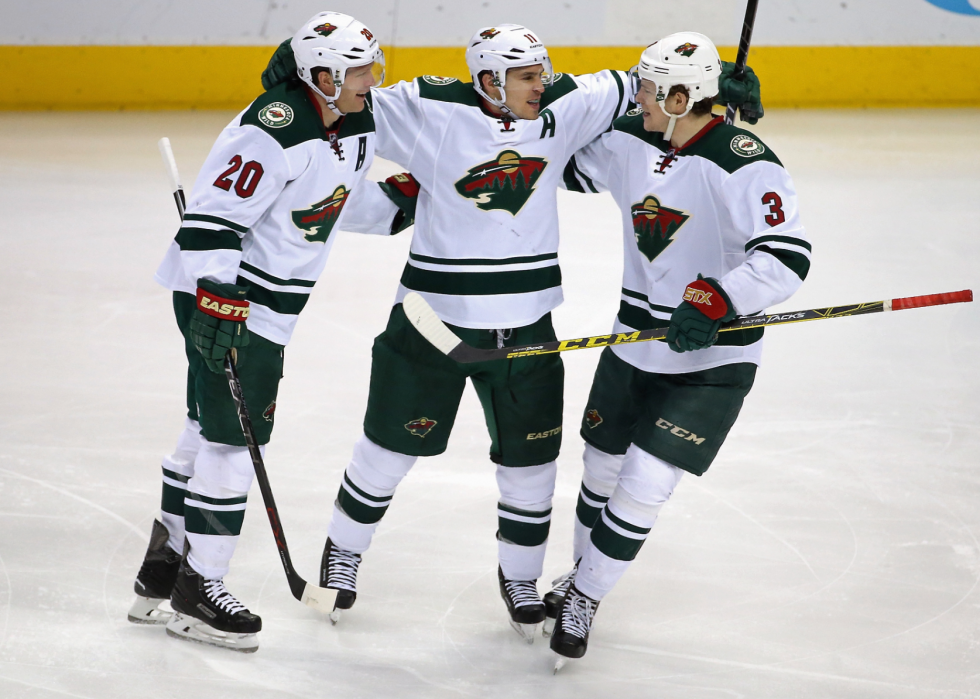
Minnesota Wild
After the Minnesota Stars moved to Dallas in 1993, the hockey scene in the Twin Cities was dim. But then a new franchise was founded in 1997 and saw its first season in 2000. They needed a name and felt that “Wild” captured what Minnesotans enjoyed about their state. The name beat out Freeze and Northern Lights, among others. They’ve never reached a Cup final, though they captured a lone division title in 2008.
You may also like: Iconic sports moments that defined the '80s
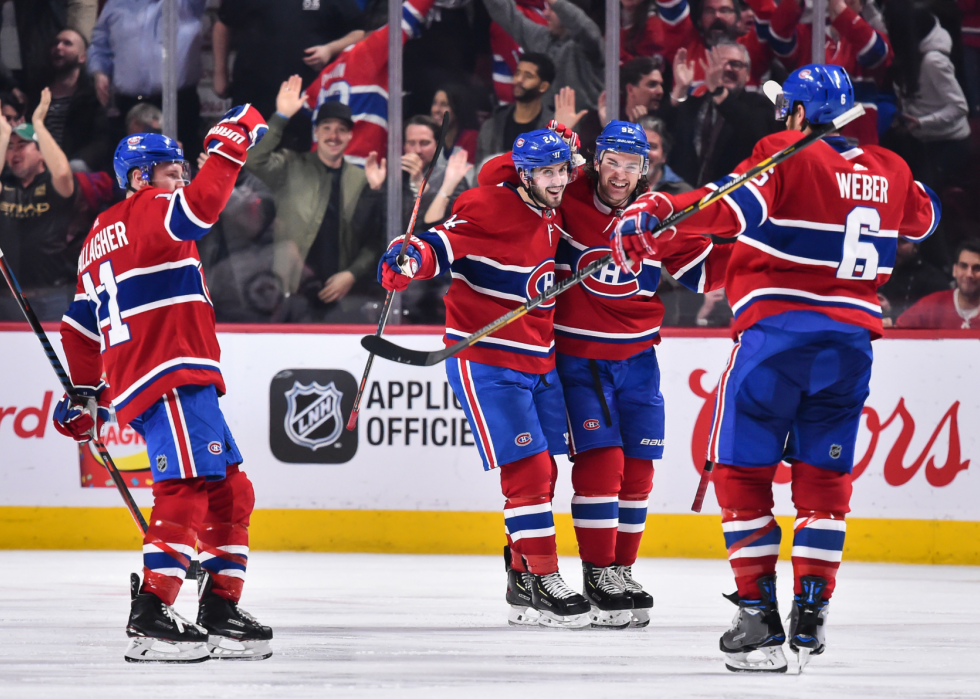
Montreal Canadiens
Over 20% of people in Montreal speak at least three languages, and French is spoken by most. That's why Montreal's official hockey team name, le Club de hockey Canadien, is easy to understand. For those with less knowledge of French, the team's nickname “Habs” is a bit puzzling. The term is short for Les Habitants, referring to early settlers. The Canadiens are one of the “Original Six” and have won a record 24 Stanley Cups.
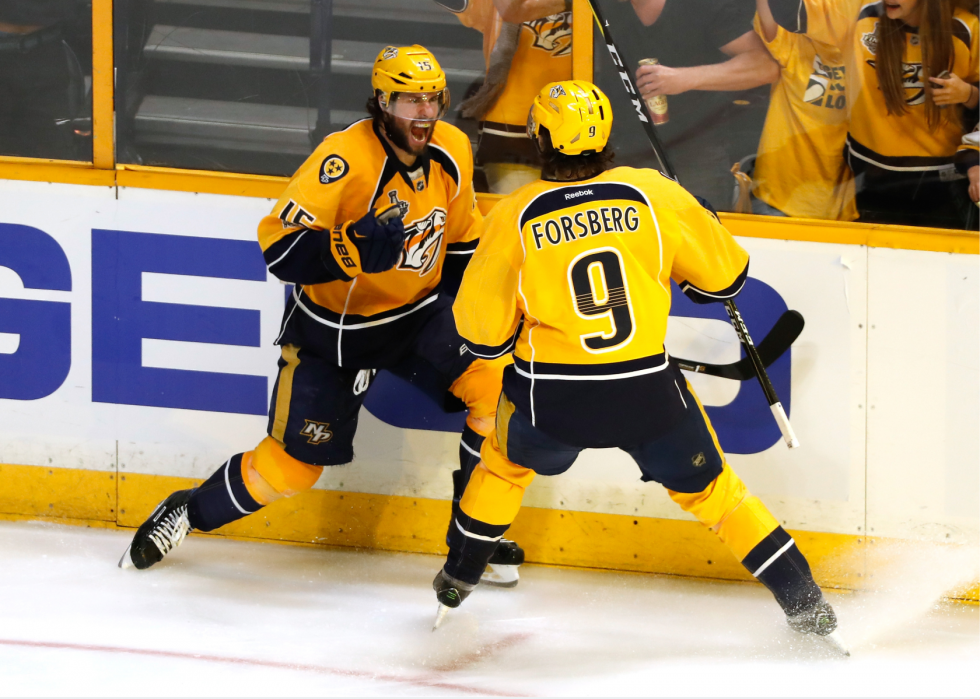
Nashville Predators
Sometimes team names reflect events in a city that captured the public's imagination. Such was the case in Nashville, where a downtown excavation project in the 1970s uprooted the fang and leg bone of a saber-tooth tiger. When Nashville was awarded its first pro sports franchise in the ‘90s, a logo was developed recalling that earlier find, and fans chose the nickname to fit. The team has played since the 1998–99 season and reached its only Cup final in 2017.
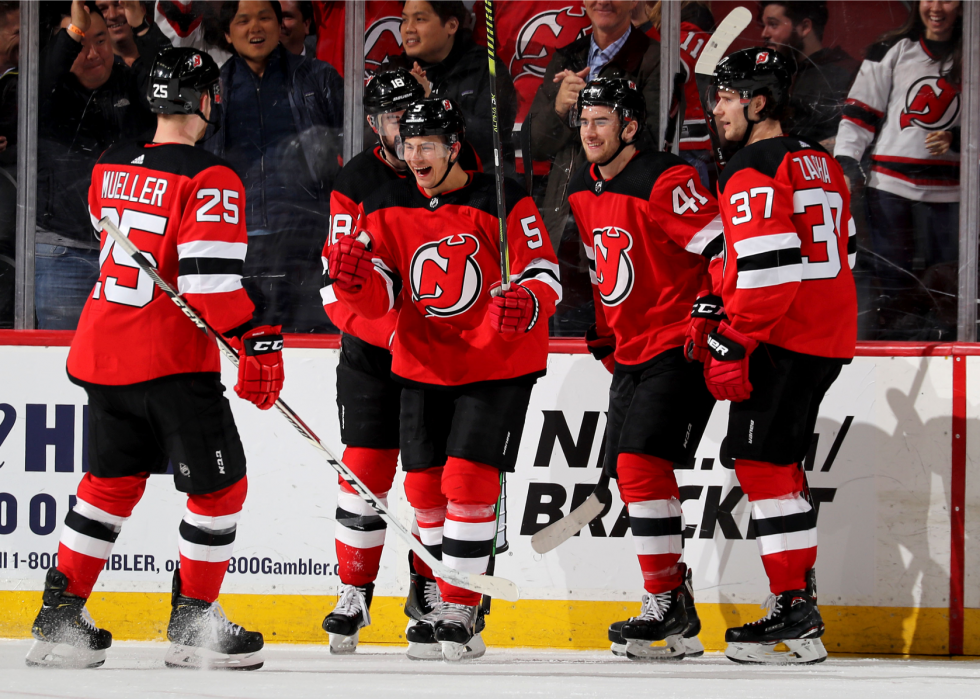
New Jersey Devils
Back in 1974, the Kansas City Scouts hockey team had a logo evoking a famous city statue of a Sioux Indian scout on horseback. When the Scouts headed west in 1976, they reincarnated as the Colorado Rockies. By 1982 the Rockies relocated again, this time to New Jersey. Now they've taken a name and mascot from folklore: the Jersey Devil, an otherworldly character said to make its home in the Pine Barrens. The Devils won their three Cups between 1995 and 2003.
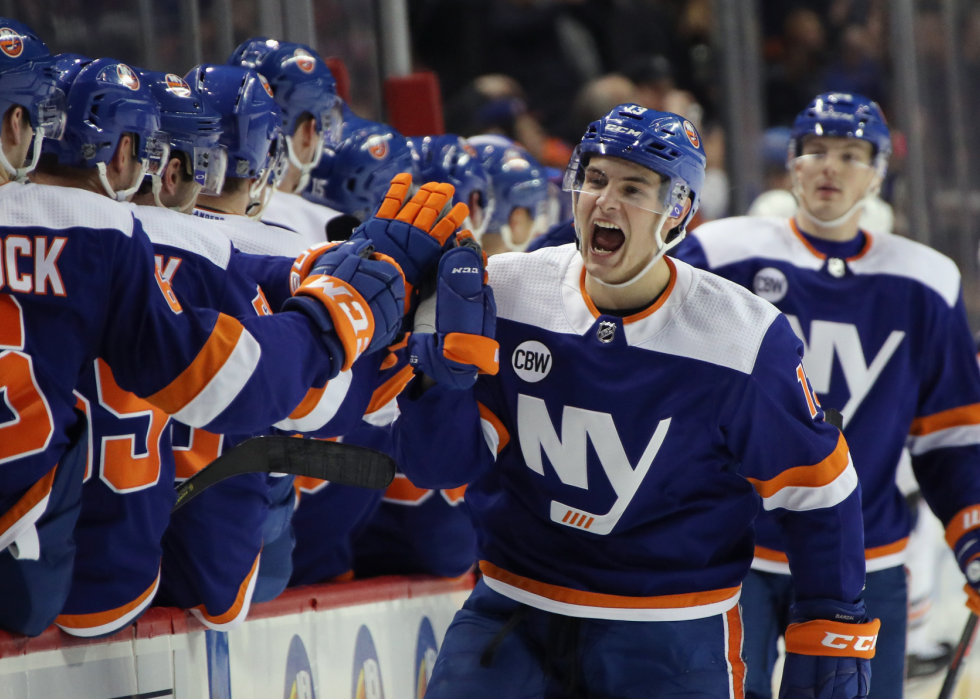
New York Islanders
When a sports team makes an island its home, some reference to that feature of geography in its name makes sense. When it's Long Island, you've already got millions of people in the habit of referring to themselves as Long Islanders, or just Islanders. The team name was founded there in 1972, and in the short span from 1980 to 1984 a dynasty was born when they won four consecutive Stanley Cups.
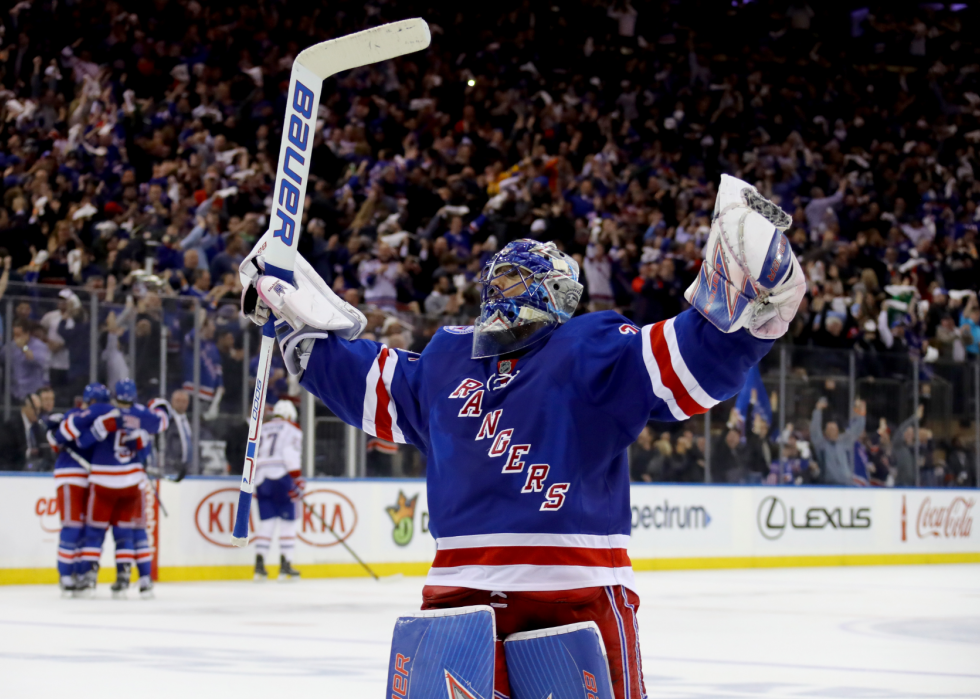
New York Rangers
Tex Rickard founded this “Original Six” team in 1926. In a play on words, sportswriters referred to the team as “Tex's Rangers” to sound like the Texas Rangers law enforcement. Rickard incorporated elements of their attire into his team's logo. The “Blueshirts” have won four Stanley Cups, the most recent in 1994.
You may also like: History of the NFL from the year you were born
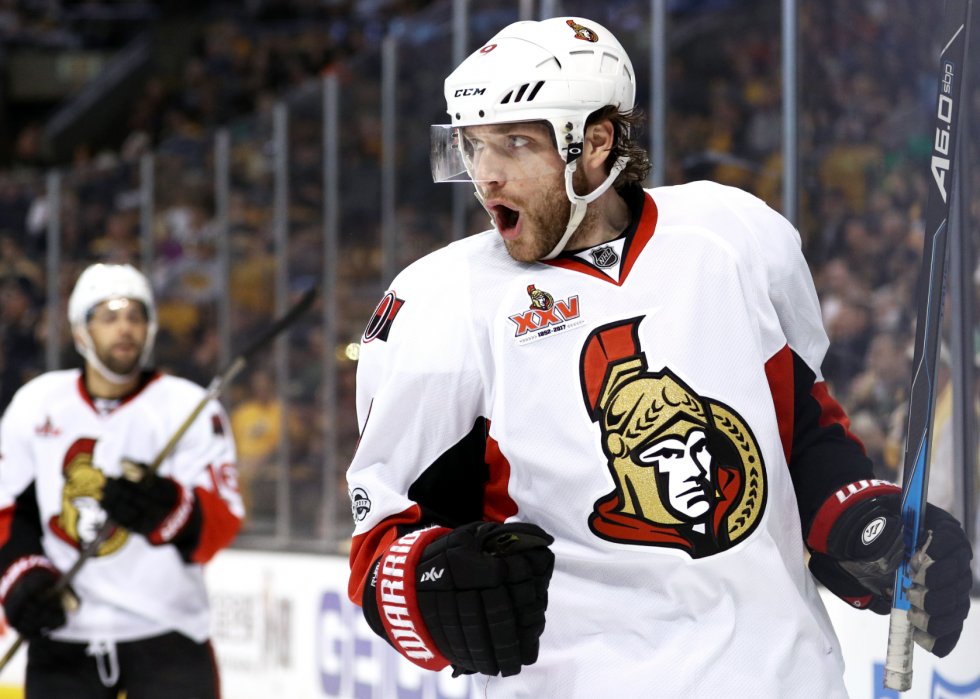
Ottawa Senators
Although there is some dispute over where exactly hockey was born, everyone can agree it was somewhere in Canada. So when you read about the Ottawa Senators, a founding member of the NHL from 1883, it shouldn't be a surprise. That team, which relocated to St. Louis in 1934, had won 11 Cups. Reborn in 1990 under the moniker of its predecessor, all in a nod to Ottawa as the capital city, the new Senators franchise has never won a title.

Philadelphia Flyers
“Flyers” wasn’t exactly a unique sports team name. There were the Flyers in Edmonton, Scotland, Niagara Falls, and so forth. The name conveys zippiness, speed, skill, and above all, joy. The people in Philadelphia thought so in 1966, and the name and logo have continued almost unchanged since then. The “Broad Street Bullies” won back-to-back Cups in 1974 and 1975.
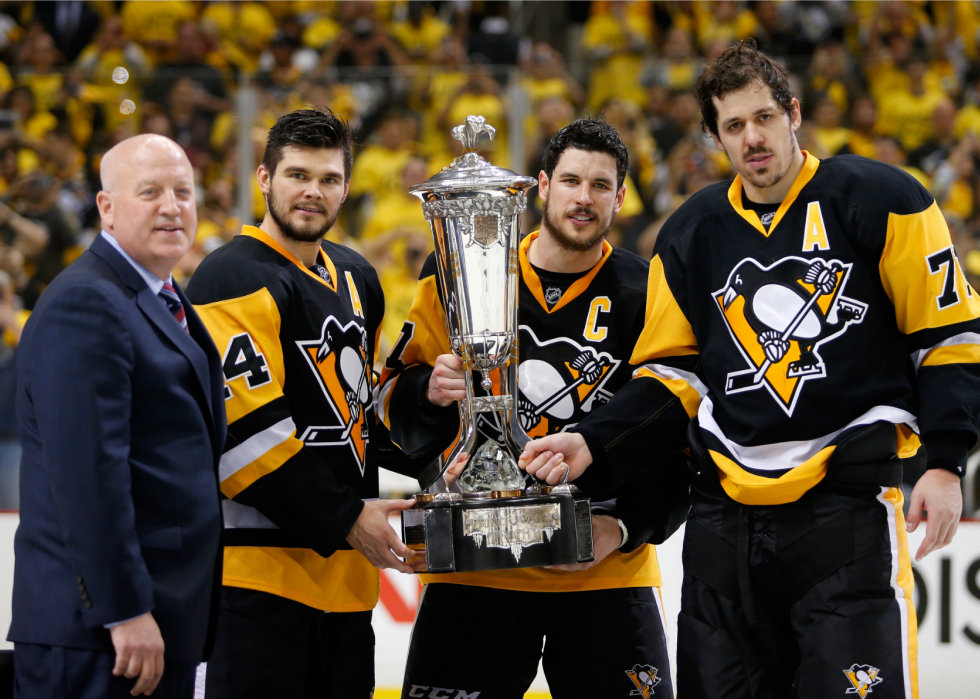
PIttsburgh Penguins
What could make the penguin even more formidable as it maneuvers its icy terrain? Skates, of course! And a seriously hefty stick to stave off hungry sharks and orcas. Maybe that's not what Pittsburghers had in mind when they built a civic center known fondly as the Igloo. Founded in 1967, the Penguins have won five Stanley Cup titles, including two consecutive in 2016 and 2017.
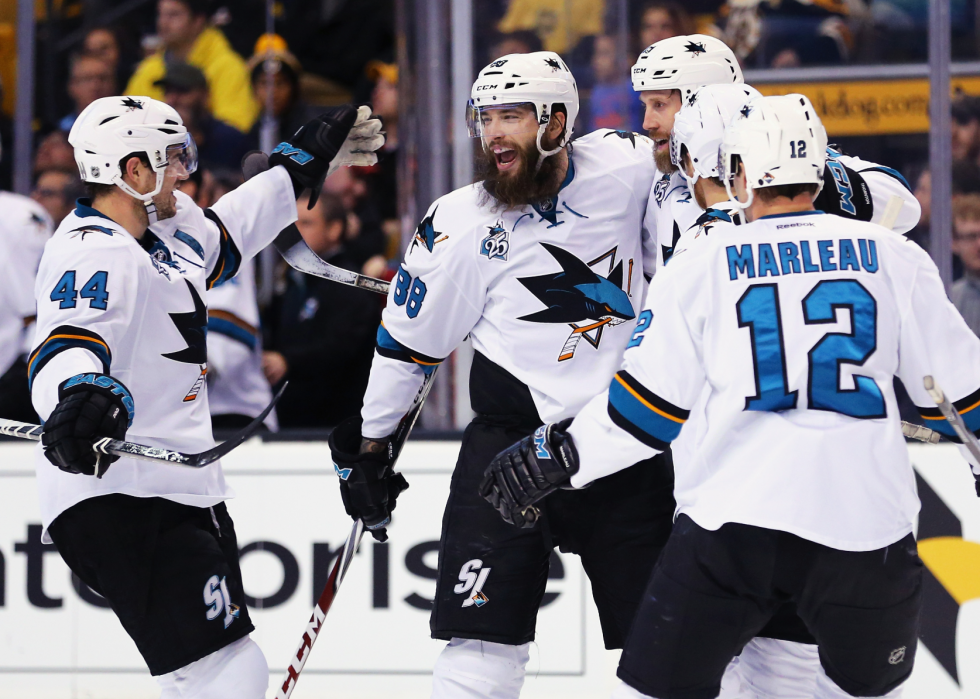
San Jose Sharks
What do Blades, Breakers, Breeze, Condors, Fog, Gold, Golden Gaters, Golden Skaters, Grizzlies, Icebreakers, Knights, Redwoods, Sea Lions, and Waves have in common? They all lost to “Sharks” when the public voted on a name for San Jose's expansion franchise in 1990. The name is a reference to the sharks in the nearby Pacific Ocean, and the logo’s triangle is a hat-tip to the “red triangle”—the nickname for the Bay Area spot in which several types of sharks live. The franchise has never won a Cup.
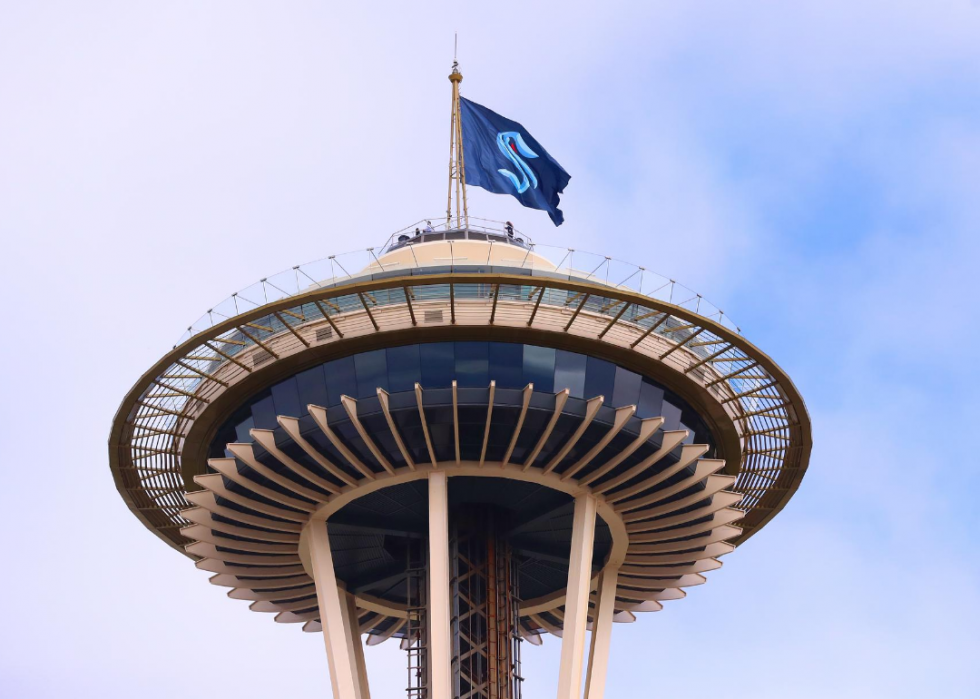
Seattle Kraken
The newest franchise in the NHL explored over 1,200 different team names and logos since 2018, when it was announced that Seattle was getting the hockey league’s 32nd team. Using a combination of fan polls, social media stalking, and top-secret meetings between owners and sponsors of the team, “Kraken” was chosen as the winner, and its logo and branding pays homage to the sea and mountains that are characteristic to Seattle’s landscape.

St. Louis Blues
When W. C. Handy published “Saint Louis Blues” in 1914, he might not have guessed that 53 years later the song would lend its name to a hockey franchise. He couldn't have predicted some of the team's difficulties over the years, either, but he might have approved the team mascot: a skating bear wearing a t-shirt with a winged musical note logo emblazoned on the front. This summer the franchise won its first ever Stanley Cup, defeating the Bruins in seven games.
You may also like: Famous baseball players from every state
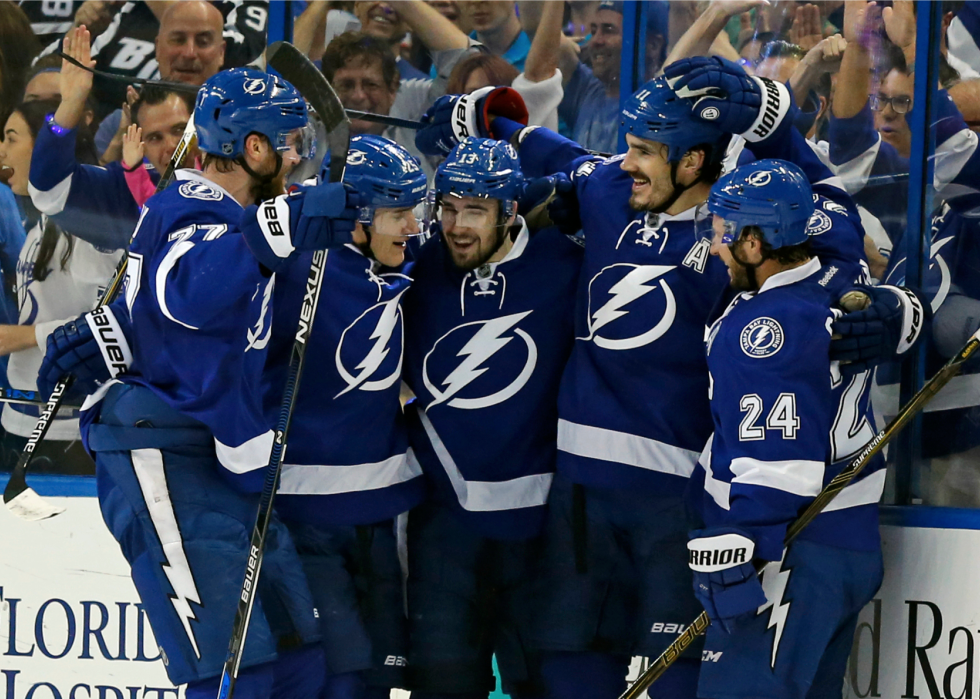
Tampa Bay Lightning
The idea for this name must have struck like a bolt of lightning. After all, the team's home is known as the “Lightning Capital of North America. So when franchise president Phil Esposito waited out a thunderstorm in 1990, he realized certain properties of lighting would make great metaphors for a sport like hockey. The franchise won its only Stanley Cup in 2004.
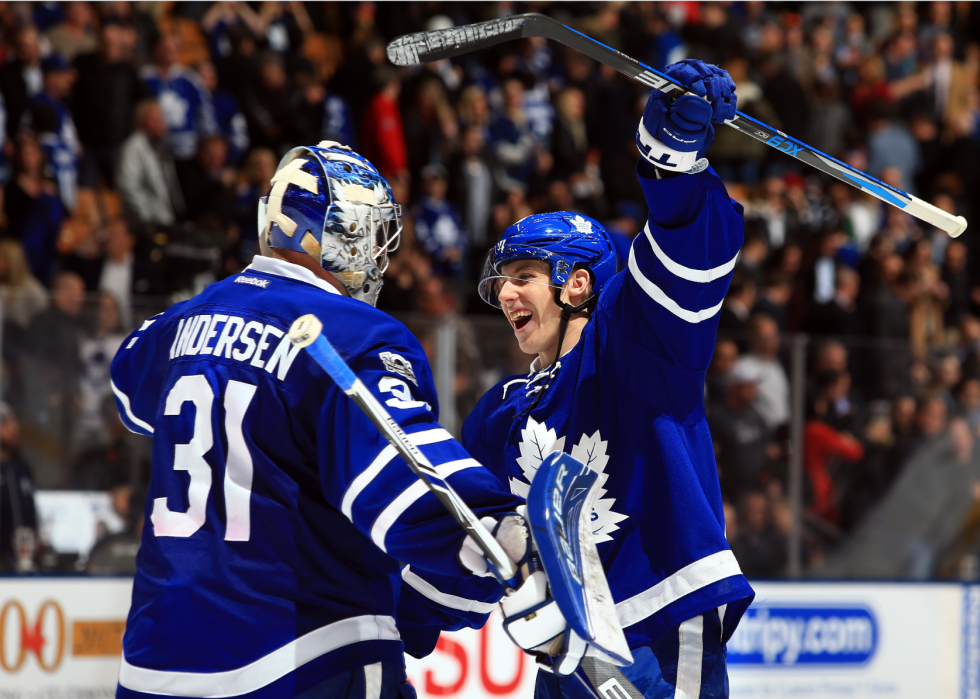
Toronto Maple Leafs
The Toronto Arenas, founded in 1917, the final member on this list of the “Original Six,” were reborn as the St. Patricks in 1919, and then, in 1927, as the Maple Leafs. Team owner Conn Smythe chose the name to honor Canada’s national symbol. The Maple Leafs have won 13 Cup titles, but their most recent came in 1967.
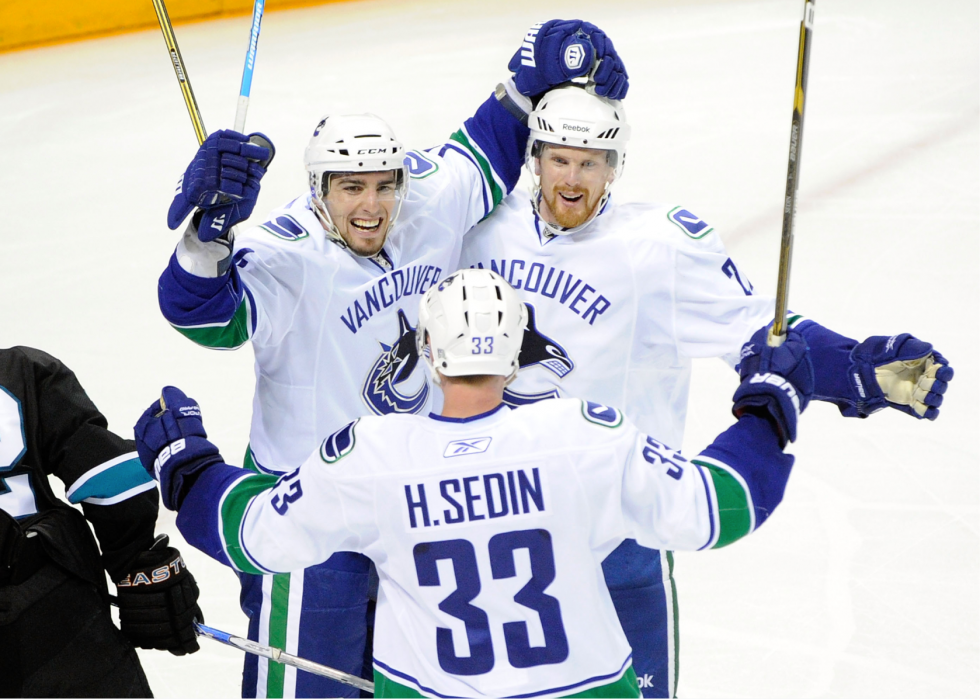
Vancouver Canucks
Word origins and naming decisions are often not straightforward. Such is the case with the Canucks, whose name might come from Irish, German, or indigenous Canadian or Hawaiian languages. Regardless, the cartoon character Johnny Canuck has been a known figure in Canada since 1869. He was once the team's primary logo, but has since been sidelined to the jersey shoulder. The team joined the NHL in 1970 and has never won a title.
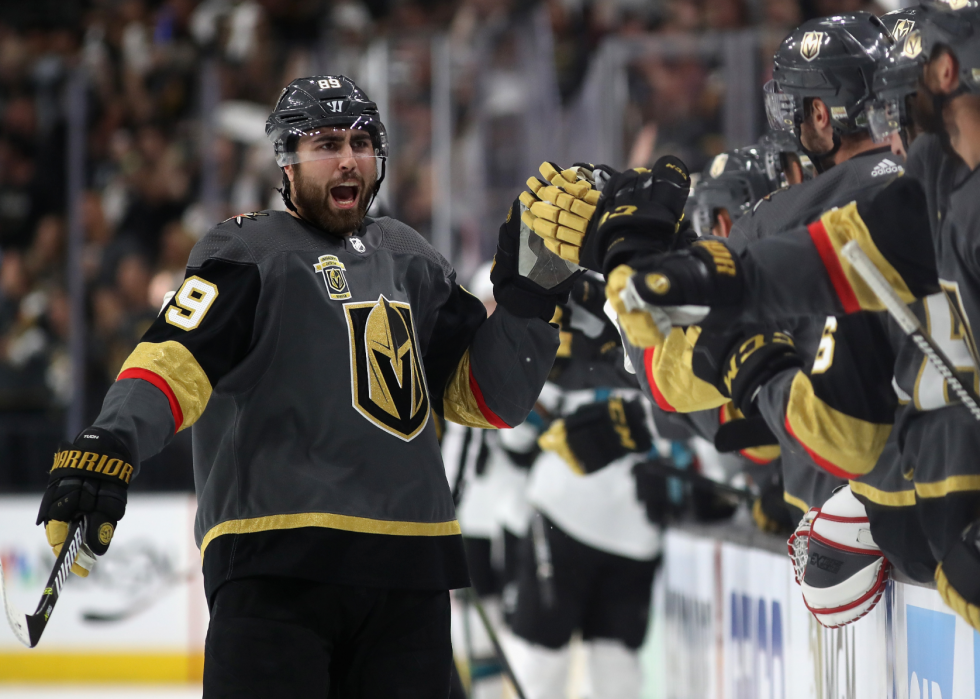
Vegas Golden Knights
Team owner Bill Foley graduated from the U.S. Military Academy at West Point. He borrowed from that team's name, the Black Knights, and applied it to his new franchise team in Las Vegas. There, knights always advance and never retreat—and do it all with shinier bling. The franchise reached the Cup final in its inaugural 2017–18 season but lost to the Washington Capitals.
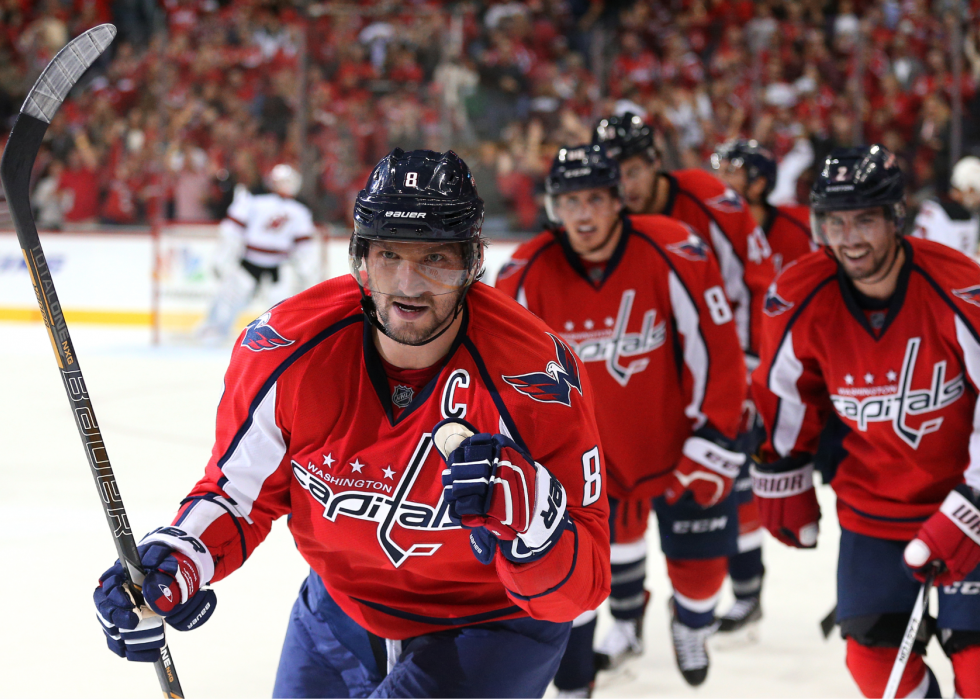
Washington Capitals
Between professional and college ranks, the Washington D.C. area is home to 15 sports teams. Many teams in our nation's capital have self-referencing names like Nationals, Whips, and Potomacs. When the city was awarded an NHL franchise in 1972, naming-contest voters made the logical choice. The Caps won their first title in 2018.
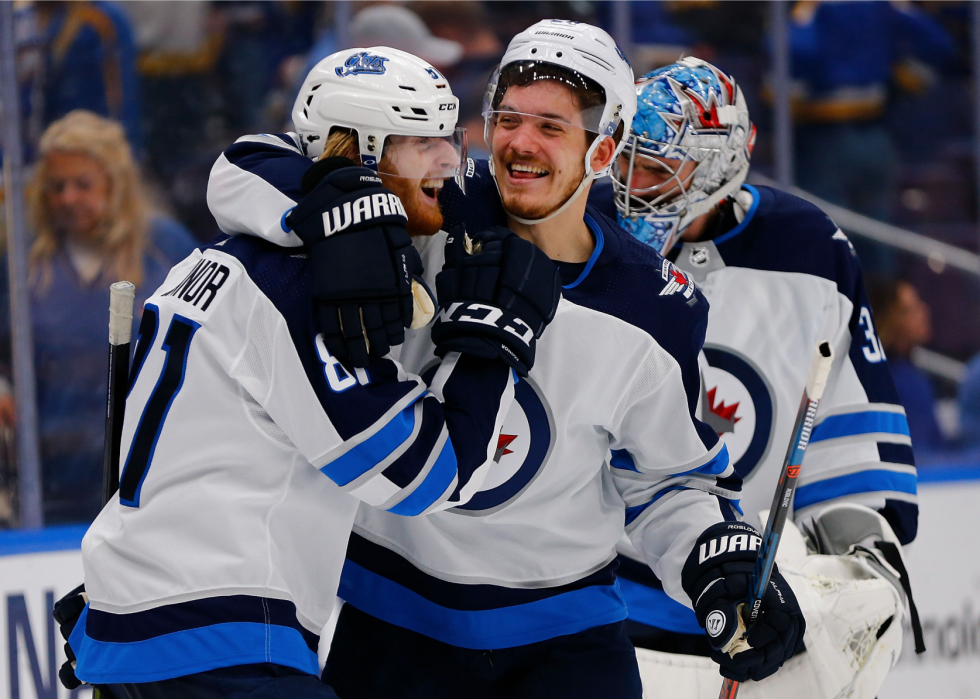
Winnipeg Jets
The Winnipeg Jets were part of the WHA from 1972 to 1979, when they became part of the NHL. In 1996 the team was sold and sent to Phoenix and renamed the Coyotes. From 1999 to 2011, Atlanta was home to the Thrashers, and in 2011, they were purchased and moved to Winnipeg and became the Jets. The franchise has never won the Stanley Cup.
You may also like: Stories behind every NFL team name

